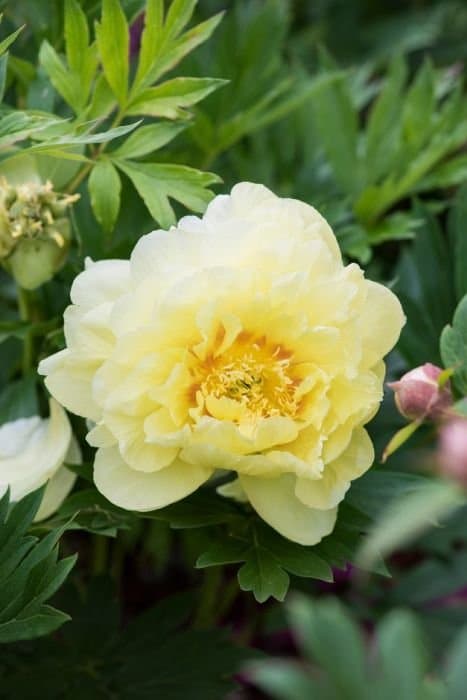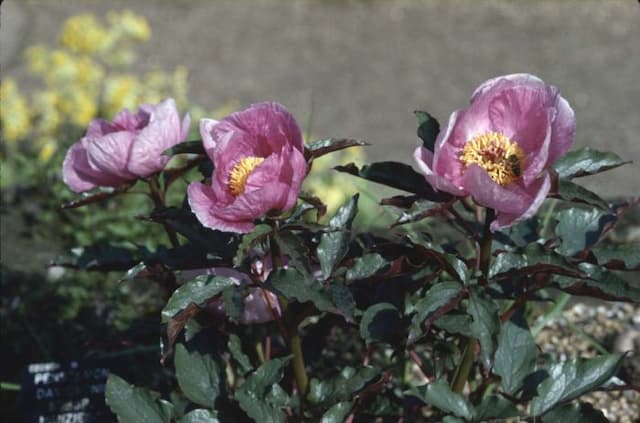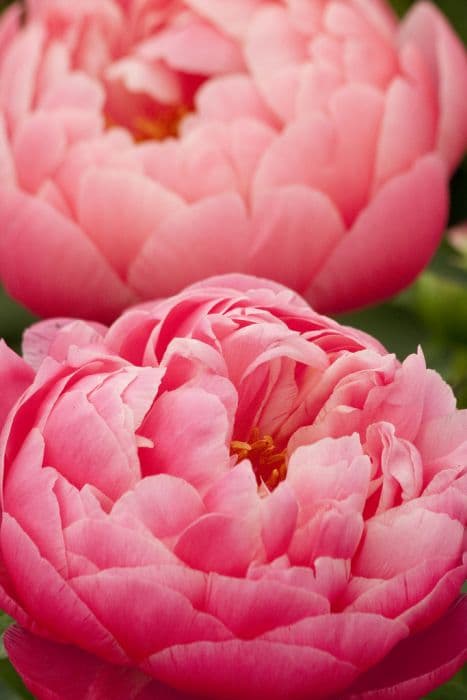Peony Paeonia 'Eden's Perfume'

ABOUT
The plant known as Eden's Perfume is a type of peony that is cherished for its highly fragrant, large, double blossoms. These exquisite flowers exhibit a delicate pink hue that can range from a soft pastel to a more vivid pink at the edges of the petals. The blooms are composed of multiple layers of ruffled petals that unfurl from tight, spherical buds, revealing a dense, lush heart as they open. Eden's Perfume's luxurious flowers emit a sweet aroma reminiscent of the scent of roses. This enchanting fragrance makes the peony an alluring presence in any garden setting, appealing not only to the eyes but also the nose. The plant's glossy, dark green foliage provides a striking backdrop for the flowers, with broad leaves that are deeply lobed, adding to its overall attractive appearance. As the showy blooms mature, they may display a cream or yellow-toned base near the center, providing a captivating contrast to the pink tones. This makes Eden's Perfume a popular choice for cut flower arrangements, where its beauty and scent can be admired up close. Overall, Eden's Perfume is celebrated for its stunning blossoms with a romantic palette and a fragrance that can pervade an entire garden space, making it a favorite for those who appreciate both visual beauty and olfactory pleasures in their floral displays.
About this plant
 Names
NamesFamily
Paeoniaceae
Synonyms
Eden's Perfume Peony, Garden Peony, Peony 'Eden's Perfume'
Common names
Paeonia 'Eden's Perfume'
 Characteristics
CharacteristicsLife cycle
Perennials
Foliage type
Deciduous
Color of leaves
Green
Flower color
Pink
Height
2-3 feet [0.6-0.9 meters]
Spread
2-3 feet [0.6-0.9 meters]
Plant type
Herb
Hardiness zones
4-8
Native area
Asia
Benefits
 General Benefits
General Benefits- Aesthetic Appeal: Paeonia 'Eden's Perfume', commonly known as peony, adds a touch of classic beauty to gardens with its lush, full blossoms and attractive foliage.
- Fragrant Flowers: This variety is known for its particularly fragrant blooms, which can enhance the sensory experience of a garden.
- Attracts Pollinators: Peonies attract bees and other pollinating insects, which are crucial for the health of the garden ecosystem.
- Longevity: Peonies are perennials with a long lifespan, often living for 50 years or more when provided with the right growing conditions.
- Cut Flower Use: The blossoms of 'Eden's Perfume' make excellent cut flowers, lasting well in vases and floral arrangements.
- Seasonal Interest: Peonies offer seasonal interest with their attractive spring blooms and sometimes again with autumn leaf color changes.
- Diverse Landscaping Uses: The plant can be used in borders, as focal points, or in mass plantings to create dramatic garden displays.
- Low Maintenance: Once established, peonies require relatively low maintenance, making them a convenient choice for busy gardeners.
- Deer Resistance: Peonies are generally resistant to deer, which can help prevent damage to the garden.
 Medical Properties
Medical PropertiesThis plant is not used for medical purposes.
 Air-purifying Qualities
Air-purifying QualitiesThis plant is not specifically known for air purifying qualities.
 Other Uses
Other Uses- Peony petals can be added to bathwater for a luxurious, fragrant bathing experience. 'Eden's Perfume' has a particularly strong and attractive fragrance.
- Pressed peony flowers from 'Eden's Perfume' can be used in crafting, such as in bookmarks or greeting cards, for a touch of natural beauty.
- 'Eden's Perfume' peonies can be used in culinary decorations, such as on wedding cakes or fine dining dishes, for their visual appeal.
- The dense foliage of 'Eden's Perfume' can offer a modest privacy screen in gardens when planted in rows or clusters.
- Whole peony blooms can be floated in large glass bowls as centerpieces for events or as home decor, displaying the full beauty of 'Eden's Perfume' blooms.
- Peony petals can be used to make natural dyes for fabrics or paper, with 'Eden's Perfume' providing a unique color due to its distinct pigments.
- Peony blooms from 'Eden's Perfume' can be used in potpourri mixes to impart their scent to a room when dried and combined with other aromatic ingredients.
- When carefully dried, 'Eden's Perfume' flowers can be incorporated into homemade scented sachets for closets and drawers.
- 'Eden's Perfume' peony petals can be used to adorn special occasion hair styles or corsages, offering a fresh and natural floral look.
- Peony 'Eden's Perfume' can be used in floral photography, serving as a stunning and fragrant subject with its large, layered blooms.
Interesting Facts
 Feng Shui
Feng ShuiThe Peony is not used in Feng Shui practice.
 Zodiac Sign Compitability
Zodiac Sign CompitabilityThe Peony is not used in astrology practice.
 Plant Symbolism
Plant Symbolism- Romance and Love: Peonies are often associated with romance due to their lush, full, and rounded blooms. 'Eden's Perfume', with its sweet scent, can symbolize the intoxicating and all-encompassing nature of love.
- Prosperity and Good Fortune: In many cultures, peonies symbolize wealth and honor. Gifting peonies like 'Eden's Perfume' can be seen as wishing someone a prosperous life.
- Beauty: With its attractive flowers and pleasant fragrance, 'Eden's Perfume' embodies the concept of beauty in its highest form.
- Compassion and Bashfulness: According to one Greek myth, peonies get their name from Paeon, a student of the god of medicine. This connection to humility and learning gives the peony a sense of compassionate wisdom.
- Nobility and Honor: Particularly in Eastern cultures, the peony is considered the "king of flowers," representing nobility and the value of honor.
- Happy Life and Marriage: Being a popular wedding flower, 'Eden's Perfume', like other peonies, is believed to bring a happy life and fortunate marriage to newlyweds.
 Water
WaterPeonies like 'Eden's Perfume' should be watered deeply once a week, ensuring the equivalent of 1 inch of rainfall, which is roughly 0.6 gallons per square yard. During the growing season, particularly if the weather is dry, it's essential to water the plants regularly. Avoid overhead watering to minimize the risk of fungal diseases; instead, use a soaker hose or drip irrigation to direct water to the root zone. During the fall, you can reduce watering as the plant prepares for dormancy. If your peony is newly planted, it may require more frequent watering to help establish it, possibly every 3 to 4 days for the first few weeks.
 Light
LightPeonies like 'Eden's Perfume' thrive in full sun, meaning they prefer at least 6 hours of direct sunlight each day. They can tolerate light afternoon shade, particularly in hotter climates, but too much shade can reduce blooming. The ideal spot would be a location that gets full morning sun and partial afternoon shade, as intense midday sun can sometimes harm the delicate blooms.
 Temperature
TemperaturePeonies such as 'Eden's Perfume' are cold-hardy and require a period of winter chill to bloom successfully, thriving between 65°F and 75°F. They can survive winter temperatures as low as -20°F and will enter dormancy during this time. In the summer, they can tolerate temperatures up to 85°F but may need protection from extreme heat. The ideal temperatures for peonies are those that provide a distinct seasonal variation, aligning with their need for a cold winter and a warm spring.
 Pruning
PruningPrune peonies like 'Eden's Perfume' after flowering, cutting back the spent blooms to maintain a tidy appearance and encourage healthy growth. During the fall, after the first frost, cut the foliage back to the ground to prevent overwintering diseases. They require minimal pruning compared to other perennials and should be pruned once annually – after blooming for aesthetic reasons and in late fall for plant health.
 Cleaning
CleaningAs needed
 Soil
SoilPeonies, including the 'Eden's Perfume' variety, thrive in well-drained, fertile soil with a pH of 6.5 to 7.0. A mix containing two-thirds garden soil and one-third compost or well-rotted manure will create the ideal environment for these plants. Ensure the soil is loosened deeply to facilitate good root growth.
 Repotting
RepottingPeonies like 'Eden's Perfume' very rarely need repotting. They prefer to be left undisturbed and can thrive in the same location for many years. Dividing or moving a peony should only be necessary every 10 to 15 years, if at all, unless the plant is experiencing poor performance or outgrowing its space.
 Humidity & Misting
Humidity & MistingPeonies, including the 'Eden's Perfume' variety, are not overly sensitive to humidity levels and do well in average outdoor conditions. They do not require any special humidity considerations and are well adapted to the typical range found in temperate climates.
 Suitable locations
Suitable locationsIndoor
Not ideal indoors; requires deep planting, full sun, cold period.
Outdoor
Plant in sun, well-drained soil, water deeply; mulch in winter.
Hardiness zone
3-8 USDA
 Life cycle
Life cyclePeony 'Eden's Perfume' begins its life as a dormant bare-root tuber planted in the soil in late fall. In early spring, red shoots emerge from the ground, developing into robust, green, divided leaves. As the plant matures, buds form at the tips of the stems in late spring, which bloom into large, fragrant pink flowers in late spring to early summer. After flowering, the plant sets seed in the form of a capsule if pollination has occurred, which matures by late summer. The foliage of 'Eden's Perfume' peony provides ornamental interest throughout the summer before dying back to the ground after frost in the fall as the plant enters dormancy. The cycle repeats each spring when the plant re-emerges from its roots, gradually growing larger and more floriferous with each passing year.
 Propogation
PropogationPropogation time
Spring-Early Summer
The Paeonia 'Eden's Perfume', also known as the peony, is predominantly propagated by division, which is best done in the fall after the plants have gone dormant. To propagate by division, carefully dig up the peony plant and gently shake off the soil, exposing the root system. Look for the eyes, which are the potential growth points on the roots—these will turn into next year's stems. Using a sharp knife, divide the root clump ensuring that each section has at least 3-5 eyes along with a portion of root. Replant these divisions promptly, making sure that the eyes are no deeper than 2 inches (about 5 centimeters) below the surface of the soil, as planting them too deep can prevent flowering. Water the newly planted divisions thoroughly to help establish them. This method allows for the creation of new peony plants that are true to the parent in form and flower.









